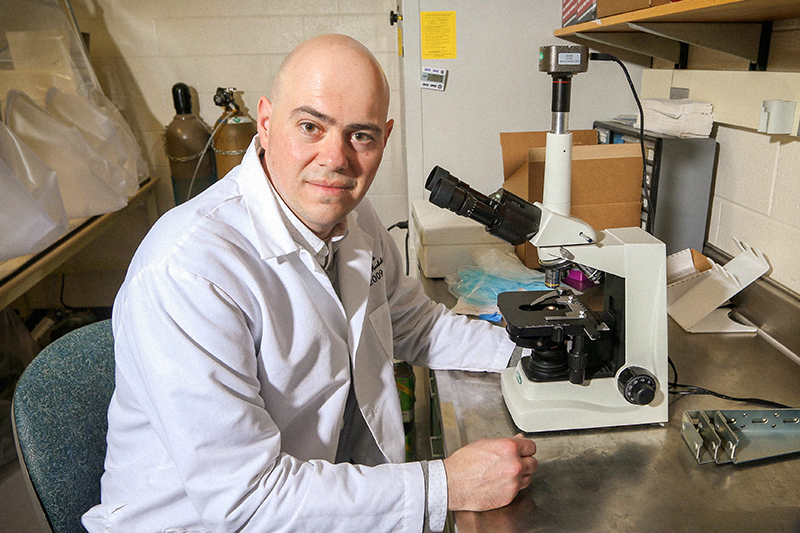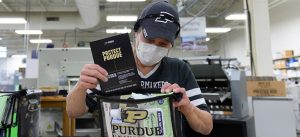An accomplished biologist and esteemed professor at Purdue University, Stephen Lindemann (S’04) has built a career that has been shaped by gut instinct.
Now an associate professor in the departments of food science and nutrition science and the Philip E. Nelson Endowed Chair in Food Science, Lindemann once studied pathogens for biodefense. These days, he has a side project studying gut microbiomes for Olipop, a beverage company created to rival traditional sugary sodas.
While Lindemann’s career focus may have shifted over time, he has always been anchored by his Purdue education.
“There have definitely been some twists and turns in my career, but Purdue has been there every step of the way,” Lindemann says. “Purdue has been crucial in my journey, especially in terms of collaboration. I work with many departments across campus, which has been essential in conducting interdisciplinary research. The resources at Purdue, like its world-class mass spectrometry equipment, have been invaluable to our research.”
Driven by a fascination with the many mysteries of microbiology, Lindemann chose to study the field at Purdue—an intellectual curiosity that has since led him in unexpected directions.
“I became fascinated by the unknown—specifically, proteins with no known function,” Lindemann says. “Biology is an area we still have so much to understand, and that piqued my interest.”
Lindemann was in the lab when he first heard the news of the terrorist attacks on September 11, 2001. The event reshaped the world in numerous ways, including the government’s increased focus on biodefense. Lindemann felt the shift firsthand and soon applied to become a Homeland Security scholar.
“The Department of Homeland Security funded my last year at Purdue and then continued to offer me a fellowship at the University of Iowa, where I looked at pathogens like Francisella tularensis and how they cause disease,” Lindemann says. “My graduate work also included internships at Pacific Northwest National Laboratory and Los Alamos National Laboratory, which led me to think more about microbial interactions. Eventually, I became interested in microbial ecology and the gut microbiome.”
After Lindemann earned his doctorate, the opportunity arose to study the gut microbiome at Purdue’s Whistler Center for Carbohydrate Research. Lindemann and his team focus on how dietary fibers, specifically polysaccharides, impact the gut microbiome and human health. Their goal is to optimize fibers to improve health, and they hope to accomplish this by gaining a better understanding of how these fibers function.
Lindemann’s career took another unexpected turn in 2018.
While attending a conference in San Diego, he had an eye-opening conversation during a chance meeting with a complete stranger—the two discovered they shared not only a love for science but also a passion for improving gut health in the U.S. That’s how Lindemann was introduced to Olipop, an innovative company on a mission to create a soda alternative with healthier ingredients.
Eventually, he joined the company’s scientific advisory board, helping to bring its vision to life.
“Olipop’s mission aligns with my view that the gut microbiome is central to health and dietary fibers are key in supporting it,” Lindemann says. “Getting Americans to eat more fiber through traditional means has been a challenge, but Olipop’s approach of incorporating it into a delicious drink is a step in the right direction. I believe this ‘stealth health’ approach—making healthier versions of products people already enjoy—is crucial to improving the population’s gut health and addressing chronic disease in the United States. For me, it’s important to see a product like Olipop, which is both enjoyable and beneficial to the gut microbiome, contributing to long-term health without sacrificing flavor.”
The scientific advisory board at Olipop frequently meets to discuss topics of interest, and members often work independently to address specific challenges, such as enhancing product healthfulness or identifying the right microbes to focus on.
“Looking ahead, we plan to continue designing and optimizing fibers, creating specific polysaccharides that can be added to food to improve gut health on a population scale,” Lindemann says. “One of our goals is to shape the future of microbiome research so that we can evaluate gut microbiome function much like we do other aspects of health. The aim is to be able to intervene predictably and reliably in people’s gut health, improving their overall well-being.”
Outside of the lab, Lindemann stays involved with the university by attending athletic events and alumni gatherings, mentoring students, and serving on alumni panels.
“My experience as a student has shaped the way I can give back,” Lindemann says. “I’m passionate about undergraduate research. It had a huge impact on my own career, and I work to provide those opportunities to current students, particularly those from diverse backgrounds. By doing so, I hope to contribute to their growth and future success.”
—Nicolle DeWitt


